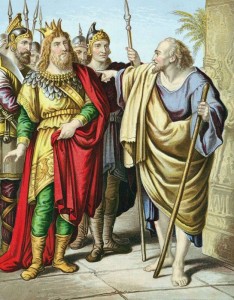Isaiah 40:1–26, The End-Times Elijah Generation Preparing the Way for Messiah
Isaiah the prophet ministered in Judah for about 40 years from 740 to 697 b.c., approximately 100 years before the southern kingdom of Judah fell to the Babylonians in 586 b.c. Judah’s captivity in Babylon would last for 70 years. The Book of Isaiah contains more messianic prophecies than any other book in the Tankah, and many of those prophecies specifically relate to the redemption through the Messiah of the two houses of Israel.
In the Isaiah 40 prophecy, according to rabbinic understanding, Isaiah is prophesying (in verses 3–5) concerning Israel’s deliverance from exile seventy years after her captivity (The Soncino Pentateuch, p. 777). This is not an incorrect interpretation of this prophecy, although it is not necessarily the only one, for we know, as with many of the Scripture’s ancient prophecies, there are sometimes multiple fulfillments. Because the old adage that says, “history repeats itself,” is true, and because human behavior remains unchanged from time immemorial, though the players and costumes change on history’s theatrical stage, many biblical prophetic themes have cyclical patterns. In the present case, where Isaiah speaks in verse three of “a voice crying in the wilderness,” (Isa 40:3) we know that the gospel writers applied this to John the Baptist preparing the way for the coming of Yeshua the Messiah (Matt 3:3; Mark 1:3; Luke 3:4; John 1:23). What in this prophecy did the gospel authors see as applying to Yeshua the Redeemer and Savior of Israel? First, Yeshua himself declared John the Baptist to be that messenger who would prepare the way for the Messiah that Malachi prophesied about (cp. Matt 11:10 and Mal 3:1). The messenger of Malachi 3 and 4 seems to be the same individual mentioned in Isaiah 40. Furthermore, Isaiah 40:3 speaks of preparing the way for YHVH and making a highway in the desert for Elohim. Clearly, the gospel writers recognized that Yeshua was YHVH Elohim based not only on his claims to deity, but based on the fact that Isaiah states that the Messiah, the Redeemer of Israel, would not only be YHVH Elohim, but that he was the arm of YHVH (Isa 53:1) making him a manifestation, if you will, of YHVH.
Not only did the gospel authors see John the Baptist in the Isaiah 40 prophecy (Isa 40:3–4 cp. Matt 3:3; Mark 1:3; Luke 3:4–5; John 1:23) because they recognized who Yeshua was Continue reading


